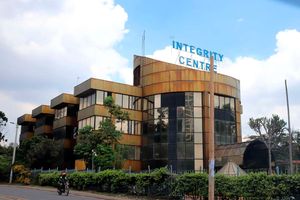
Counties and national government agencies will now have to indicate geographic coordinates of projects in tender documents.
Counties and national government agencies will now have to indicate geographic coordinates of projects in tender documents, in new changes aimed at curbing ghost projects that have consumed billions of shillings.
As part of new requirements under the government’s newly rolled out electronic government procurement system (e-GPS), purchasing entities are now required to indicate the physical location of projects through geographic coordinates, a shift from the past where initiatives were only identified by name.
Sources in government say the new requirement was introduced to curb a habit where some agencies and counties have been claiming the same projects, when they have been funded and developed by one, leading to multiple allocations and eventually losses running to billions of shillings.
The Public Procurement Regulatory Authority (PPRA), which oversees procurement in the national and county governments, says the provision of geographic coordinates where physical projects are located will enable it to undertake site visits and confirm the progress of different projects.
“This will ensure that citizens can track where the projects are being undertaken and even for PPRA as a regulator, when our officers go to undertake performance follow-up, they will not need to go to see the procurement entities. They will use those coordinates and go to the specific areas where those projects have been undertaken,” said PPRA’s director-general Patrick Wanjuki.
Under the e-GPS, which was rolled out on July 1, 2025, all procurement activities by national and county governments must be undertaken on the digital system where actors such as the Treasury, the Controller of Budget (COB), the Auditor-General, and the PPRA have visibility.
The procurement information such as tenders and contracts will then be automatically uploaded to the Public Procurement Information Portal (PPIP), where Kenyans can see companies that have been awarded different contracts.
“With the coming of the e-GPS we expect that there will be transparency, fairness, and accountability in the public procurement processes,” Mr Wanjuki told Daily Nation.
PPRA said the coordinates will ensure that projects are tracked from when they start to completion, which will minimise cases of projects stalling despite payments.
Cases of counties and national government agencies taking credit for a single project have been witnessed in the past costing the public huge sums of money.
In 2019, for instance, the State Department for Infrastructure raised the alarm after Bomet governor went on the ground to take credit for and launch projects funded and carried out by the Kenya Urban Roads Authority (Kura).
“The governor moved and commissioned the road done by Kura even without the knowledge of the national government. There is a problem of oversight in the county governments,” Julius Korir who was Infrastructure Principal Secretary (PS) at the time told a parliamentary committee.
The PS accused counties of taking credit for projects done by the national government to hoodwink county residents that they were working, incidents that led to double allocation of funds to the same projects. Some counties erected billboards taking credit for projects done by national government agencies, he said.
In other instances, the Auditor-General has flagged cases where despite hundreds of millions of shillings being paid to fund projects, there was nothing on the ground.
The PPRA said the new requirement would enhance accountability for money spent on development projects, especially where the projects are physical in nature.
“There has been an issue arising with the aspect that certain procurements have been undertaken and payments made but when you go on the ground, there is nothing. With the e-GPS, it is now a requirement for all works projects that the procuring entity must provide the coordinates of where that project is being undertaken,” Mr Wanjuki said.
The coordinates requirement is just one of the changes tenders under the e-GPS will have, others including the removal of requirements such as proper pagination and the requirement of stamps.






